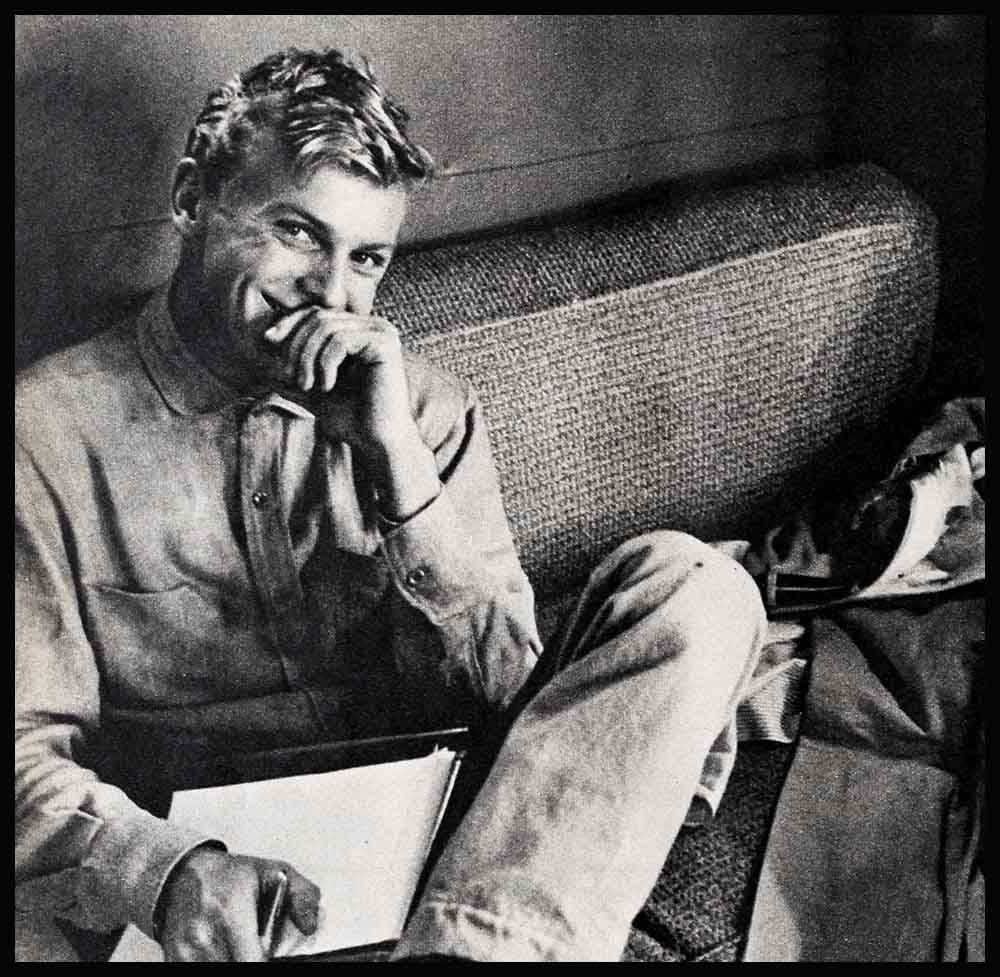
Blackout
I’m the first person to agree with people that Tab Hunter is A mixed-up. After all, if you’re a person who’s going to develop, a person who’s going to grow and change—for the better, that is—you have to go through different phases. Some of them are black and unpleasant. I’m referring now to those dark periods of despondency and questioning, periods when everything seems oppressive and dim and somehow unreal. When they hit, you have to face up to them, come to your own decisions, and then let the world decide if you’ve done right or wrong. I guess I’m leading up to talking about my own black period. I might as well face it—blackout is a better word. I went way out on a limb, jumped off in the dark, and sat there holding my breath, scared like a rabbit who huddles nervously behind a bush, waiting for a hunter to make up his mind about which direction to take. Naturally I don’t like to talk about it. But I’ve got to get over the feeling of wanting to hide from it. Norman Vincent Peale says every negative thing can be turned into a positive action. He calls it “growth living”—living, in other words, that has development. I realize that’s what I must try to do. Hard as it is, it’s the only way.
There’s a poster in my bedroom from the stage play “Cat on a Hot Tin Roof,” by Tennessee Williams. The illustration of the girl in the poster vividly depicts this black mood I’m talking about. From the way her head hangs as she’s leaning against the bed in the picture, you can sense the trouble and torment she is suffering. She’s lost and disturbed, in the depths of despair. I keep that poster as a reminder that when you’re on the bottom, the only way you can go is up. Remember that. Because that’s one important thing I learned from all my miserable months of anguish.
How did I get into such a state? Looking back, I realize that it must have been building up for a long time, and the roots went deep. But when the big blowup came, it was set off by a simple thing, the way a fuse, harmless in itself, can set off a keg of dynamite. In my case, it was the ordinary, routine matter of choosing the movie roles I was to play.
Now I’m not saying every actor should have the right to choose his Scripts. Lots of times actors might not be able to visualize themselves in certain roles, and, as a result, miss out completely on developing their careers. For instance, if Tony Perkins hadn’t been asked to do “The Matchmaker” he might have missed out on revealing his comedy talent.
But with me it was different. I was getting script after script that called for the same, easy-does-it kind of character, a nice and simple good-time Charley with an occasional dramatic moment thrown in.
I went along with it. I figured it was good training. I tried to learn all I could about cameras and film technique for actors. But like someone who’s fed pablum all day long for months and months, it was getting nauseating.
Then, one day, it happened. I had enough. It was like having an upset stomach and feeling pain all over you, and you realize you’ve been unfair to yourself, that you have been on the wrong diet for a long time.
But there are good ways and bad ways of treating an upset stomach.
Maybe I took the bad way. I don’t know. I haven’t been able to decide that yet. At any rate, I rebelled!
I’ve been trying to figure it out, and I can’t pin down exactly what it was that made me yell out like that.
Being a child of divorce, I wonder if this had anything to do with my rebellious outbreak. It’s possible. As a child, I felt that life had short-changed me. My father deserted us when I was two, and my mother had to work very hard to support my brother Walt and me. Because of that, we moved around a lot and never had any steady friends. Mother had to put us in a military school part of the time, to be sure we were looked after properly. Lots of times we had to wait in a lonely apartment for Mother to come home—when the other kids were going off to baseball games with their dads. Maybe, when things started going badly with my career, I felt that life was giving me a raw deal again, and this was my way of lashing out at fate.

There was another aspect of it, too. I doubt if anybody remembers me in a picture called “Island of Desire”—I was that bad—but I’ll never forget it! By a fluke of luck, I got the leading role in that picture—they were looking for an unknown, and brother, was I unknown! I was nineteen, and green as they come. The inevitable happened—instead of being my big break, it was a colossal flop. What really hurt was that it ruined my chances for a long time afterward. In a way, it was good, because when I finally got another good break in “Battle Cry” I was ready for it. But I think this experience made me all the more wary—and scary—because it taught me that the right part at the right time can make you—and the wrong part can finish you, but good.
Whatever the deep-rooted reasons. I was burning. My temper’s a pretty hot one when I let go, and brother, I gave it free rein. I told my studio executives I was in agony playing those goody-goody roles. I wanted something challenging for a change, something that would give me a chance to act. Wouldn’t they give me a break?
Well, I was offered “Darby’s Rangers” which, for my money, after all the rah-rah roles I played, was as challenging as jumping off a one-foot ledge.
So, I took the stopper off again. I really let go with the temper this time. I’m ashamed to admit it, but I was boiling inside and I blew my lid I said if that was the kind of stuff I was going to play in the movies for the rest of my life, then to blazes with it all. I’m embarrassed now just thinking about it, but when something’s been troubling you for a long while, you forget about shame and disgrace. Especially if you have a temper that’s a lulu.
But that was wrong. I’ve learned that much, at least. It was completely wrong to blast out like that emotionally, to let myself go and say all kinds of things which I now regret. That’s why we have minds to control our feelings. Otherwise, this would be one wild, wild world.
While I was rehearsing for the TV production of “Hans Brinker,” I went to the theater one night to see Ralph Bellamy act in “Sunrise at Campobello,” the Broadway hit play concerning President Roosevelt’s crippling attack of infantile paralysis, which could have been the sunset of his career. instead, being the great man he was, F. D. R. turned the crisis into a sunrise.
Now, those people, the Roosevelts, had a lot of times when they could have sounded off and let their tempers fly. But each time they showed tremendous control and understanding.
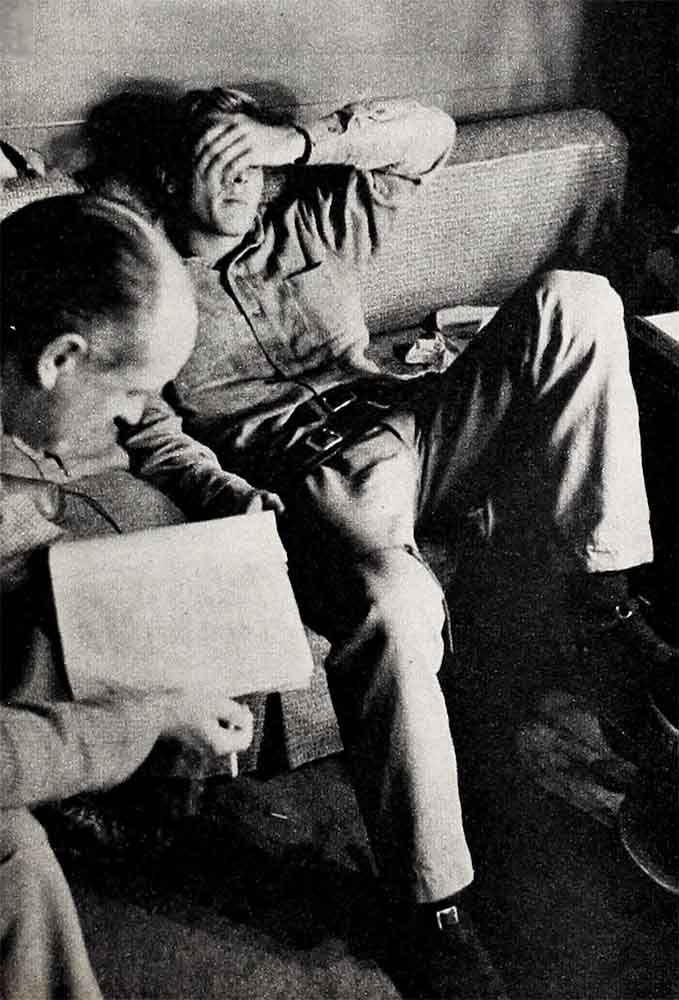
I’m not saying we’re all able to do that. But we can certainly learn from these people. They offer us an example.
When I lost control with my big studio executives, I thought I was a pretty smart guy. I was going to run off and make records. Hah! The laugh was on me. The studio, I found out, controlled my recording contract, and although there was nothing in this world which prevented me from making records, they couldn’t be released without the studio’s permission.
Of course they were mad at me, the studio bigwigs, so they wouldn’t give Dot Records the okay to release an album I recorded. I had had such a big hit with “Young Love” (it sold over two million discs), and the Dot people were anxious to follow it up with an album right away. But Warner Brothers said no dice.
Tough? You bet! But it was a punishment. And when you do something you know in your heart is wrong, you expect to pay for it. And I was paying.
Brother, I sat around for a long time. They suspended me. There was no money coming in for almost a year, and, believe me, that’s depressing.
I composed a song during that lean period with an assist from Gwen Davis. When Photoplay printed it, it made me feel better. After that sales picked up, and Gwen and I were happy with the results.
Finally I filled in as a guest on Dinah Shore’s TV show. Matter of fact, Dinah gave me confidence in myself during those dog days. She insisted I sing harmony with her on her Sunday night program, and I said “Nothing doing.” But she was adamant. I told her most of my singing belonged in the bathtub, but she wasn’t one to be put off. She said if I got nervous and forgot the harmony, she’d signal the orchestra to play the music louder, and no one would know I was off.
What a gal! She practiced with me and kept giving me the encouragement I needed during our rehearsal sessions.
That’s what you need when you’re down and out. Someone who believes in you, someone who won’t allow you to stop believing in yourself. Dinah gave me that strength then. She kept pushing me and prodding me and telling me what a lot I had on the ball. And she made me feel so at ease with myself.
But, besides a human being who can give you encouragement, you have to have a belief in the workings of God. You have to believe that God is testing you, trying you out so that you’ll become stronger as a spiritual person.
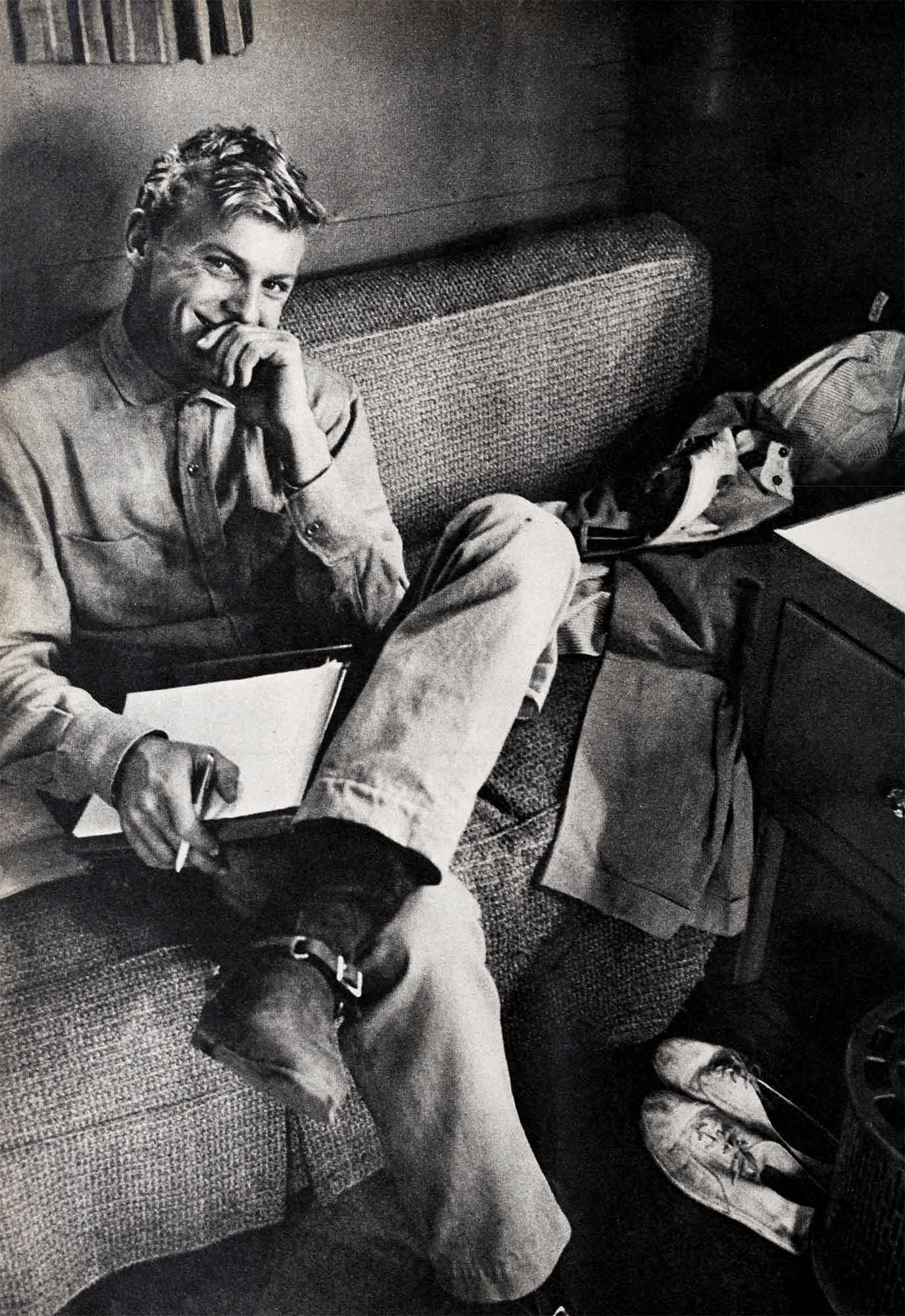
Everyone knows what a fast and frantic business film-making is. Everything has to be done in a hurry; otherwise the expenses keep mounting. I’ve always found, though, that if I take the time (sometimes I’ll even go twice a day—once during lunch, once in the evening) to visit a church, I’m all the more content because of the peace that comes through me.
And during the preparations for “Hans Brinker,” I took an apartment off Fifth Avenue in New York and there was a church literally around the corner (there always is—all you have to do is look for it!). We had plenty of trials and tribulations on that show. The costumes weren’t ready until the last minute, and we hadn’t ice-skated with them on. And there was enormous trouble getting the freezing apparatus to freeze the water for the ice-skating scenes.
When I was in the midst of all that hubbub and confusion, I went to church—even if it was only for fifteen minutes. I entered a world of calm, of quiet, and I could communicate on a spiritual level—which is the most rewarding of all.
And my faith was rewarded. I got my answer from God—not in some sudden revelation or dazzling miracle—but in the inner peace that came to me, and helped me, for the first time, to see my problems calmly and objectively.
First, I considered my suspension. Dinah was a help, yes, but, let’s face it, she wasn’t my studio. She couldn’t press a magic button that made everything hunky-dory.
How was I going to start the ball rolling with them, with the studio executives? A friend of mine told me he had heard a studio vice president complain bitterly about me. The executive said I was the most ungrateful person they had ever worked with.
This upset me. Since the studio wouldn’t budge an inch, I wouldn’t budge. But you can’t let things stay at a standstill forever. I weighed everything in my mind a hundred times—a look-at-yourself-now-you-fool sort of thing.
I looked at what I had done to myself, and I didn’t like it. I was unemployed, unable to work because of my contract. I told myself I had been a jerk. I feel like a jerk even now when I think about it.
So I swallowed that mad thing we call pride. I wrote a letter to my studio bosses, apologizing for my past behavior and asking if I could see them for a few minutes. We arranged an appointment.
Only this time I didn’t sound off like a blast furnace. I had learned that didn’t pay off. I talked to them in a low voice about why I had been unhappy in the kind of roles I’d been playing, and I wished they’d give me some consideration for different scripts.
They listened. They, too, were very polite. We behaved like gentlemen. And not long afterward they asked me to play in “Gunman’s Walk” for Columbia Pictures. I wanted to do it. It was my first loanout and a great part. Then they gave me permission to do “Portrait of a Murderer” on “Playhouse 90.” Then, the biggest news of all came when they offered me the leading role in the film production of “Damn Yankees,” the big Broadway musical hit.
So what did I learn from all that?
Patience. Clap a hand over your mouth when you want to shoot it off. Write a letter if you’re good and mad, and put it away for a day or two; then read it and you’ll see what a jackass you could have made of yourself.
You know, if we all earned to control our lousy tempers we’d be happier people. I’m convinced of this. Certainly there are times when a person has to sound off or else he’ll burst. But let it out on the walls of your house or to the open countryside. Don’t sound off to the people that matter to you because you’re bound to regret it. And regret can eat away at your insides until it leaves you without any decent perspective.
THE END
It is a quote. PHOTOPLAY MAGAZINE JULY 1958


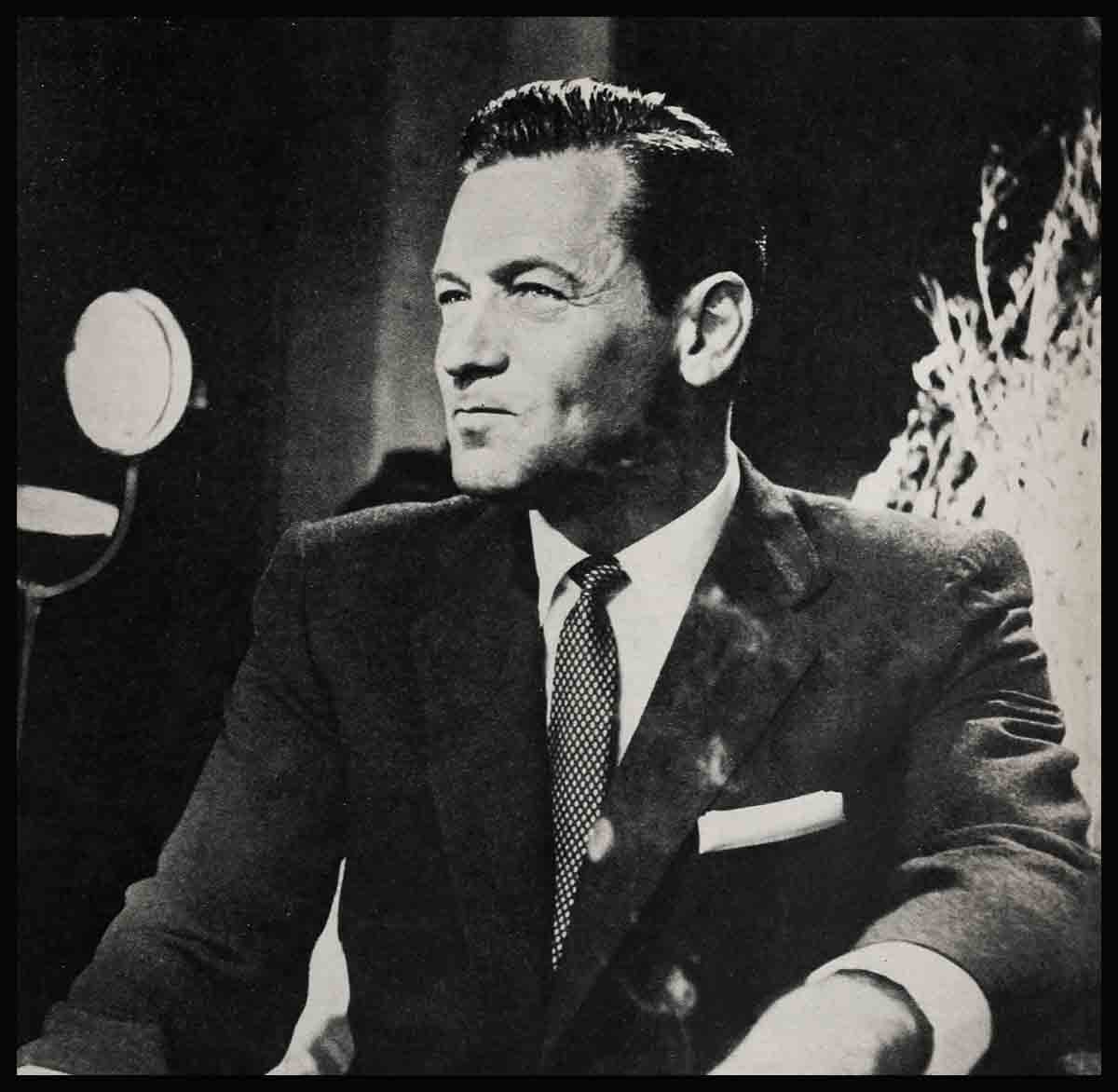

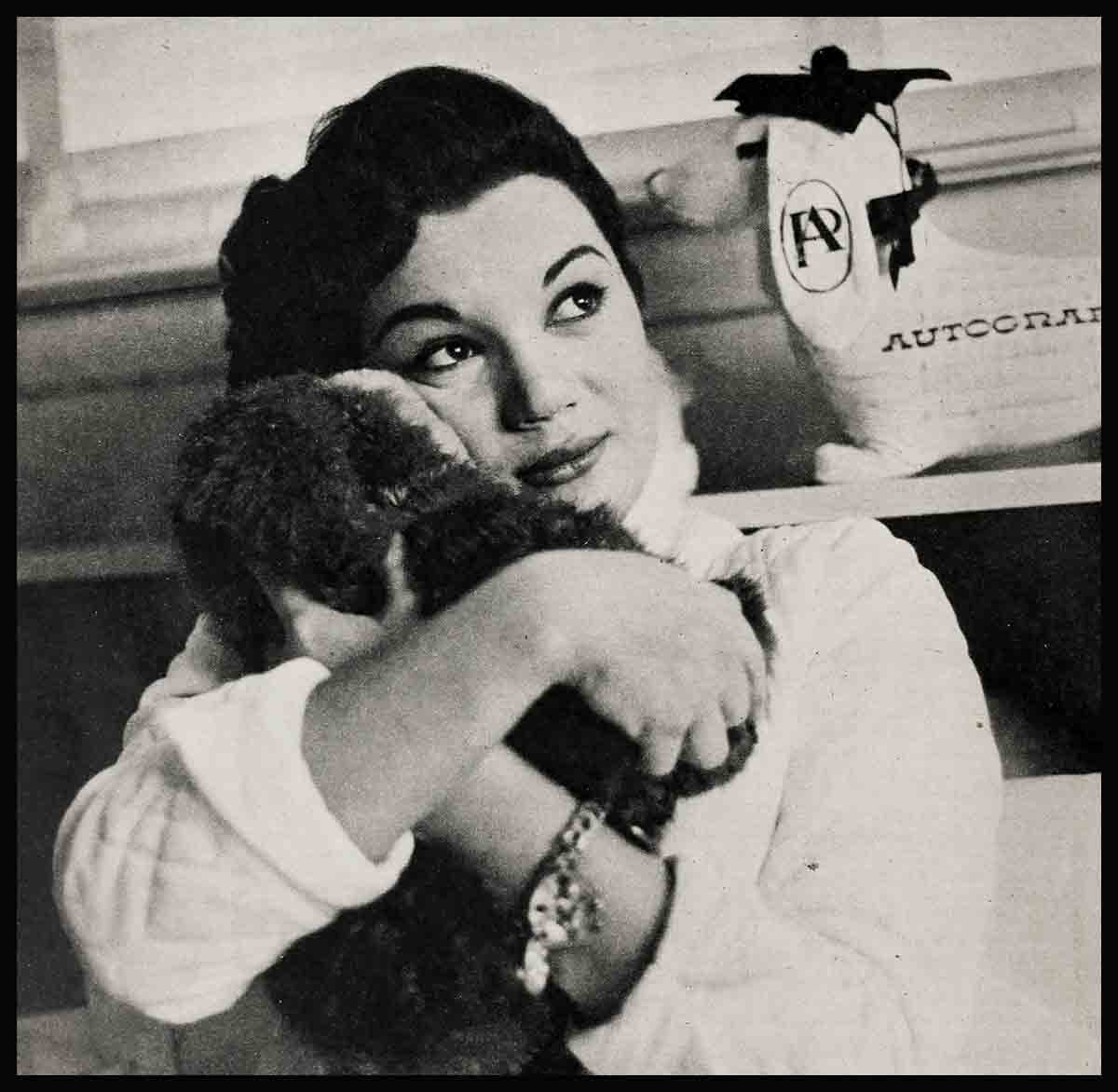
zoritoler imol
23 Nisan 2023This is the right blog for anybody who desires to search out out about this topic. You realize so much its almost arduous to argue with you (not that I truly would want…HaHa). You positively put a new spin on a topic thats been written about for years. Great stuff, simply great!
zoritoler imol
3 Ağustos 2023great put up, very informative. I wonder why the opposite specialists of this sector don’t realize this. You must proceed your writing. I’m sure, you’ve a huge readers’ base already!